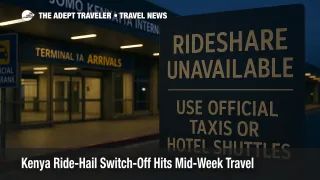Kenya Ride-Hail Switch-Off Hits Mid-Week Travel

A rolling "switch-off" by app-based drivers has entered mid-week in Kenya, with reports of suspended or intermittent service on major platforms such as Uber and Bolt. The action follows price and commission grievances and has drawn public backing from transport-union leaders. Travelers moving around Nairobi, Kenya, including airport runs, should not assume ride-hail availability and are advised to pre-book licensed taxis or confirmed hotel shuttles for Jomo Kenyatta International Airport (NBO) and Wilson Airport (WIL).
Latest developments
Drivers aligned to multiple associations switched off their apps beginning Sunday, November 2-3, and continued actions through Wednesday, November 5, pushing the stoppage into a third day with patchy availability in Nairobi and other cities. Advisory trackers flagged a planned nationwide ride-hail strike window to start November 3-4, and local coverage on November 5 noted the action continuing mid-week.
Kenya's Transport Workers Union leaders say they are preparing a court petition targeting what they term unfair platform practices, including commissions above Kenya's regulated cap, unilateral price controls, and account deactivations without due process. Tech and local press reports on November 5-6 highlighted the legal posture and the union's coordination with driver groups. While litigation is separate from the current switch-off, it signals sustained pressure on pricing and policy.
Airport transfers: what to do now
For airport runs, the simplest hedge is to reserve a licensed taxi or a hotel shuttle in advance. The Kenya Airports Authority directs passengers to official taxi ranks and cautions against accepting unsolicited ride offers inside terminals. This is the best option when apps are offline or surge-priced. If you prefer a pre-arranged car, reputable private-transfer providers and tour-operator car services can meet you kerbside with a name-board; confirm your fare, payment method, and pickup point before you fly.
At Jomo Kenyatta International, the official taxi rank sits just outside Arrivals, with fares set per vehicle, not per person. When ride-hail is intermittent, expect longer queues at the rank, and budget extra time to reach central Nairobi. At Wilson Airport, where many safari and regional flights originate, the same advice applies, with private car services a practical fallback during peak outbound banks.
How it works: why a "switch-off" bites travelers
Unlike a formal strike with pickets and fixed hours, a switch-off is decentralized. Drivers simply go offline, shrinking available cars and spiking wait times or prices on remaining inventory. Because platforms update estimated arrival times dynamically, availability can look normal until you try to confirm a ride near a shift change or during a weather or traffic pulse. The effect is most pronounced around trunk corridors between JKIA, the CBD, Upper Hill, Westlands, and out to Karen and Langata, where many travelers rely on app pickups after evening arrivals.
Practical planning tips
If you are landing at NBO after dark, lock in a hotel shuttle a day ahead and share your flight number so dispatch can track delays. If you need a same-day car, approach only marked desks or the official rank outside Arrivals, agree on the fare before entering the vehicle, and ask for a printed or digital receipt. Avoid accepting rides from solicitors inside the terminal. If you must use an app, try scheduling in advance and be ready to pivot to a licensed taxi if the driver cancels or ETA slips.
What we are watching
Union announcements and operator statements could clarify the expected end point for the switch-off or any interim concessions. Separate legal filings by labor groups, if lodged, would not immediately restore supply but may keep pressure on pricing and commission policy in the coming weeks. We will also watch airport-transfer provider capacity at typical peaks, given a likely spillover from ride-hail demand.
Final thoughts
The Kenya ride-hail switch-off has tangible effects on curb-to-gate planning in Nairobi. Treat app availability as uncertain, pre-book a licensed taxi or shuttle, and leave more time than usual for airport transfers until drivers and platforms reach a resolution.
